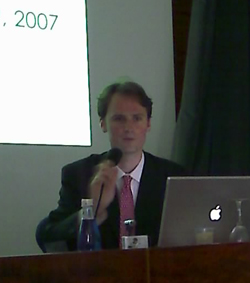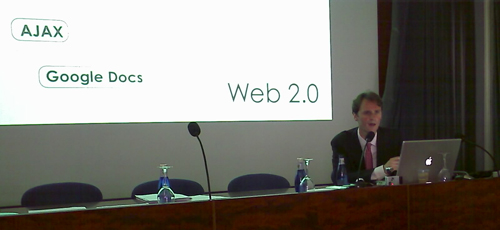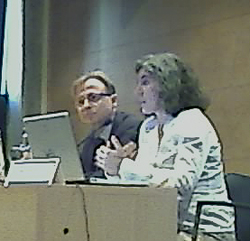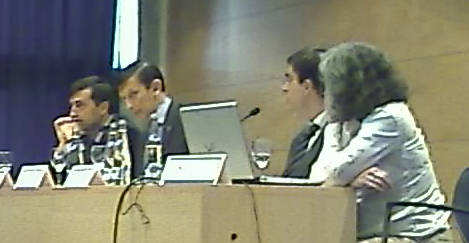By Ismael Peña-López (@ictlogist), 26 July 2007
Main categories: Knowledge Management, Meetings, Open Access
Other tags: sdp2007
No Comments »
Quick, brief introductions to tools used by researchers in the management of their… uh, life?
BibCiter
Free software bibliographic manager. Allows both management of bibliographies and publication on the net (RSS feed included)
Yep
File manager. Mostly for PDFs you can tag. Mac version only.
LinkedIn
Social networking. Really effective as based on degrees of separation”
Dopplr
To manage one’s trips. Export to calendar by iCal. Shows who else is going to be in that place.
ClaimID
User centered identity. Avoid inconsistent identities over different websites.
HyperPo
Text analysis. Frequencies of words, information about the text.
Dapper
Data mapper.
del.icio.us
Social bookmarking
ma.gnolia.com
Social bookmarking. You can have groups
SDP 2007 related posts (2007)
By Ismael Peña-López (@ictlogist), 25 July 2007
Main categories: Cyberlaw, governance, rights, Knowledge Management, Meetings, Open Access
Other tags: sdp2007
4 Comments »
The main criticism Talha Syed makes is that it should be possible to shift the debate from the established mainstream (economic) discourse (for or against, but inside the system) and try and move towards new mental maps, new ways of thinking.
Premises of conventional approach
- homo aeconomicus: man is naturally narrowlyh self-regarding material gain
- preferences fixed, invariant
- policy is neutral
Premises of most critics
- heterogeneous rather than unitary motives
- but still relatively exogenous to policy
- policy should be neutral (efficiency)
Further departures
- heterogeneous
- but context-sensitive, exogenous to policy, culture
- normatively, neutrality untenable, undesirable
Pluralist motives
- intrinsic: internal drives and ambitions; enjoyment
- social: activity’s social contribution; peer approval/credit; social recognition/esteem
- extrinsic: prosperity, wealth; social status, hierarchy; power
We should ask ourselves whether it’s true that once you throw money on the table
, the economical / homo aeconomicus / extrinsic reasons to create do crowd out the other two categories of motives. It usually has been stated that yes, but there are no serious positive analysis about this. Yochai Benkler might do right in describing what’s happening in the generative Internet, but he somehow manages to shape the whole thing into Liberalism. But, should it have to be this way? Is this the only way? Is there no alternative?
Context Sensitive
What mix of motives flourishes depends on which motives are:
- socially acknowledged, valued
- expressed or pursued by peers, rivals, leaders
- reinforced or undermined by institutional signals
And maybe there’s some room for policy makers and policies to reinforce or give incentives to one or another motive depending on the context given.
Open Science
- Sustaining foundational, exploratory research: markets under-incentive for these; provides a somewhat de-centralized alternative to state direction
- Relatively rapid dissemination: rapid growth; cutting down on reducing duplicative failures and successes
- Quality controls: less internal conflicts of interest; no property barrier to peer review (and strong incentives for it)
- Effective and cost-effective: scientists being motivated partly by pleasures of inquiry and desire for credit and satisfactions of social contribution contributes to effective performance (Henderson & Cockburn, 2001); also is cost-effective
- Intrinsic virtues of these motivations: sustaining such a a motivational culture is arguably worth valuing intrinsically, for its own sake, as part of what constitutes an attractive scientific culture and surrounding society
Crowding out
Raising money incentives can dampen non-monetary motives:
- undermining social meaning of a practice
- undermining responsibility, self-direction
- undermining self-esteem
- reducing overall gain from activity by making unavailable those benefits which simply can’t co-exist with money payment
- corroding non-monetary virtues
My reflections
- I think that for those policies to foster other motivations, we should somehow let entrepreneurs understand those policies as not ways to benefit dumping of one’s market. Actually, most reinforcements of IP rights/regulation are just reactions to, I guess, such a feeling.
Readings
More info
- Henderson, Rebecca; Cockburn, Iain M. (2001) “Publicly Funded Science and the Productivity of the Pharmaceutical Industry” In Adam B. Jaffe, Scott Stern, Joshua Lerner (Eds) Innovation Policy and the Economy. Cambridge: The MIT Press
SDP 2007 related posts (2007)
By Ismael Peña-López (@ictlogist), 24 July 2007
Main categories: ICT4D, Knowledge Management, Meetings, Open Access
Other tags: sdp2007
No Comments »
Student research seminar: Benjamin Addom
This is a proposal for a theory-driven Evaluation Research using Fourth Generation Evaluation Framework (FGE). The history of agricultural development reveals that agricultural technologies over the years have been bought, borrowed, or stolen and therefore should not necessarily be domestic. The model of diffusion of innovation especially has been applied in the transfer of these technologies to developing countries. TEEAL and AGORA are two initiatives that are transferring scientific knowledge from the North to the South. The proposed research tries to explore or assess or evaluate the merit of the initiative to the primary users (researchers, students and policy makers) and its worth to the secondary users (farmers) in Ghana. The concept of global and local knowledge, theory of absorptive capacity of “community”, community ties theory, and the technique of social network analysis are being proposed.
Main aspects
- Inefficient mechanisms for informatino/knowledge “transfer” (exchange)
- Inadequate investment in research internally
- Use of outdated technologies
Arnold and Bell (2001) argue that the exponential growth of ICTs has transformed the ability to take advantage of knowledge developed in other places of for other purposes.
WSIS Action Plan, Line C-7, item 21 on e-Agriculture.
Faculty and researchers only had access to print copies of serials that were years, if not decades, out of date (Wallace & Jan Olsen, 1980).
Research background: Cornell University TEEAL Project.
Research background: FAO AGORA Project
The study will evaluate
- Link between TEEL/AGORA and researchers/students
- Link between researchers/students and the farmers
- What content do Researchers/Students “transfer”
- How does the social structure of the communities facilitate or retard use of the knowledge?
- With what effects?
Theoretical Framework
- Concept for knowledge sharing – GDN or WB, Szulanski (2003)
- Absorptive Capacity of Communities – Cohen and Levinthal 1990 Xahra and George (2002)
- Theory of Community Ties – Warren (1978)
- Social Network Theory – Perkins et al. (2002)
My reflections
- I guess I’d add some experiences from the Open Access world, specially when dealing about the diffusion of knowledge in open environments and how to measure it
More info
SDP 2007 related posts (2007)
By Ismael Peña-López (@ictlogist), 18 July 2007
Main categories: Knowledge Management, Meetings, Open Access, Participation, Engagement, Use, Activism
Other tags: sdp2007
No Comments »
From Lecture to Conversation, by Dan Gillmor
“Democratized” Media
Not in the sense of voting… but participation, production, access
Lots of data, previously unreleased, previously unrecorded, now come to light because there’s someone there, in situ, to collect them and share them in the shape of text, photo, video, etc. And all this data is (almost) immediately made public… enhanced and brought to you by RSS feeds.
Indeed, data is not only collected by treated, thus becoming information. Does this make of all of us journalists? people? academics? nonprofits? corporations? Steve Jobs posts Thoughts on Music instead of conceding an interview: is the he the journalist?
It is, indeed, the best time ever to be an entrepreneur journalist Same for nonprofits (under another model, of course), such as Global Voices.
Media remixability
Multimedia mashups are becoming more and more popular due to the ease to make them (and the impressive availability of huge amounts of content, I’d dare ask).
More and more, citizens are asked to contribute with their stuff to traditional media… but people also do it by themselves, and upload their stuff on the Internet, either in their own spaces or shared spaces provided by third parties.
Actually, people had done this before. But now its easiear, ubiquous.
Problems?
- Media overload
- Who to trust
- Need for media literacy, for both producers but, specially, for consumers
Basic Principles (for Audience)
- The audience should be skeptical… but just about everything
- but adjusting a “trust quotient” for each site
- Keep reporting
- Learn media techniques, not only technologycal, but also about media power, how to use it, etc. Training about principles, practices, ethics, law…
Basic Principles (for All Journalists, Pro and Amateur)
- Throroughness
- Accuracy
- Fairness
- Independence
- Transparency
Daily Us
- Popularity is not enough
- Reputation
My reflections
- Keeping on with the question whether i.e. bloggers are journalists… they might be somewhere within the range of being zero journalists to absolute journalists. Do they really need to adhere explicit manifestos about their ethics? always? never? only if they are really close to being “real” journalists? should it be kept implicit? expliciting it is just a means to try and shape oneself’s identity as journalist?
- Keeping on with the issue of the Daily Us and reputation… will academic blogs ever count (academically, scientifically)? will some kind of reputation system (à la hacker?) override/complement traditional peer review? there actually exists some kind of peer review on blogs through comments, pingbacks and trackbacks and blogrolls (and other “citation” systems), blog/website rankings, and so?
- will everyone be a prosumer by default and his respective “trust quotient” will draw the redline between amateurs and professionals?
Downloading Democracy, by Steve Schifferes
From 2004 to 2005 people audience for elections has trippled, over all due to increased broadband use at home, but also due to increased Internet use at work (something not specially prosecuted at the UK).
Another reason is that media have really covered the “online campaigns” (the BBC making the difference with other media.
The election audience is similar to the BBC News website audience, which is known to be different to other BBC platforms: Internet users are more interested in politics and current affairs. This could be due to the bias the Internet itself induces on users: medium to high class, young profile, etc.
And the consumption of politics information the do on the Internet is huge. Indeed, young viewers use the BBC web more but also use other news sources. They really go “out” of the established media and look for other voices.
But only a minotiry were mobilised to become political activists. Surprisingly, the bias of political blogs (they approach a determinate party’s discourse) is increasing. Thus, it looks like the web is positive for political engagement
My reflections
the web is positive for political engagement
… but it looks as it is not the traditional engagement parties expect people to take- is this engagement more focused on concrete actions, issues… on organizing smart mobs?
- As an answer to the previous point, Steve Schifferes states that, at least from now, blogs and digital media are more likely to be reactive to (a) parties’ proposals and (b) traditional media coverage and information (in the form of adherence or criticism) rather and be more proactive and the origin of actions. This does not mean they cannot (are not) being proactive, but this is not the norm
Readings
More info
SDP 2007 related posts (2007)
By Ismael Peña-López (@ictlogist), 09 May 2007
Main categories: Digital Literacy, Education & e-Learning, Knowledge Management, Meetings, Open Access, Participation, Engagement, Use, Activism
7 Comments »
John Palfrey, Executive Director Berkman Center of Internet and Society, presents his seminar Born Digital at UOC headquarters, organized by the University’s UNESCO Chair in e-Learning.
John introduces his speech as a trip through some reflections that arise from the fact that some people (i.e. born in the middle eighties and on) have always lived with the Internet and digital technologies. Those people live/interact on digital landscapes that do have some specific characteristics.
 John Palfrey
John Palfrey
Digital landscape
Digital identities, in two senses. One is be present on the Internet. Second, to be able to shape one’s identity at one’s will, as the Internet allow one to.
Multi-tasking: lots of windows open and things being done at the same time
Digital media: all your stuff is created in digital form (you might never ever print it) and it can be mixed, edited, changed… mashed up, and it will stand this way, digitally. And, indeed, is not only digital media, but digital platforms. And even if they are at a very early stage, there is already now a new layer above traditional http that is working as a new means of digital communication. This layer is shaped by devices like Second Life, Flickr, RSS or the Wikipedia.
From consumers to creators: Of course, this mashing up involves changes in cultures, intellectual property problems… new challenges arcane for digital immigrants, not to say analogue citizens.
New technologies/features: Google Docs, AJAX, tagging, hackability, wikis, social networks, RSS. RSS surely made Web 2.0 go from just a cool idea to a big change in the state of things.
Lightweight collaboration: multiple users on distributed workgroups where people collaborate as long and as intensively as they want to. In Yochai Benkler’s words, is a democratising innovation.
An international perspective: New contexts and new meanings. People like (and also expect) commenting others’ reflections. Tagging and geotaggin provide, again, new contexts for content. And those contexts are most of them relying on a new concept of trust, which enables strong networks… and business models.
Addressing perceived threats
Security and safety: cyberbulling
Privacy: everything on the Internet is public… anyone lost a job offer because of sensible photos on the net? unintended audience, replicability, persistence, searchability, unintentional contributions.
- Tier 1: our own profile. You got control over what you post, and you can configure your own privacy settings.
- Tier 2: your friend’s profile. Friends upload a photo of yours and you untag it, removing any liaison to you.
- Tier 3: Blogs, Flickr, social networks. Friends upload a photo and you have to ask for them to remove it.
- Tier 4: facial recognition systems. Friends upload a photo of you and tehc tags it for them with face recognition (Riya). How to undo this?
Intellectual property: people creating new things from old things is increasing (as it is increasingly easy) and the perspective is that intellectual property rights issues (i.e. lawsuits) are going to be a big issue in the nearest future (present!).
Information expectations:
- credibility: “hidden influences”, grazing, misinformation… are common on wikis and blogs
- information overload
Positive outlook
So, what’s the agenda from now on?
media literacy skills, expression/identity, empowering creators, information sharing, maintaining connections
Opportunities: creativity, media literacy, social production, semiotic democracy
Blogs and Wikis: knowledge creating, equity/democratic, participatory, empowering individuals, autonomy, cross-cultural and community building
Opportunities: Information creation, semiotic democracy, participatory, empowering individuals, access to information
 John Palfrey
John Palfrey
To end, John briefly presents digitalnative.org:
An academic research team — joining people from the Berkman Center for Internet & Society at Harvard Law School and the Research Center for Information Law at the University of St. Gallen in Switzerland — is hosting and working on the core of this wiki, which illustrates the beginning stages of a larger research project on Digital Natives.
“Digital Natives” are those people for whom the internet and related technologies are givens, whereas “Digital Immigrants” migrated to these technologies later in life (Prensky, 2001). Digital Immigrants know how life existed in the pre-networked society, whereas Digital Natives take networked communication as the foundation of their lives.
The focus of this research is on exploring the impacts of this generational demarcation. By learning as much as we can about Digital Natives, their way of life, and their way of thinking, we can address the issues their digital practices raise, and shape our legal, educational, and social institutions in a way that supports and protects natives, while harnessing the exciting possibilities their digital fluency presents.
Questions
Challenging question by Max Senges: is it possible to live with several identities at the same time? John thinks that no and, in the end, identities seem to converge on your real one, and your blog or whatever sooner or later reflects who you really are.
An interesting circle is being created: technologists create technology based on expected market users, but the users reshape this technology by using it, and again, technologists re-reshape the technology and so on. How can this be controlled, managed, etc.
César Córcoles: digital identity (on intensive live online) will become something normal, but now it is seen as (a) geekery (b) a bad thing to do (lost of time), so what should we, as academics, do? John answers that, actually, the problem is that academics are also digital immigrants, and thus they first have to learn. Open Access might be a good way to legitimate new means of distributing content and from an academic basis or point of view. (Academic) blogging is still not very popular, but how to foster it?
Ana Zúñiga: about information overload, the problem sometimes is that there is a strong lack of digital literacy, specially informational literacy, so you know where to go to in order to get high quality information.
Cristina Girona and John (and many others) engage in a debate about not using technolgy by itself, but for final purposes, such as educational purposes. But there is a need not only to think about technology in classrooms, but also to think about teaching itself.
Emma Kiselyova excellently points the fact that digital immigrants will disappear with time and digital natives will, sooner or later, rule the world. In the meanwhile, in the impasse, what should be done? How can educational institutions make the bridge, lead the rupture that digital technologies are causing.
I point, following Emma’s line, that all in all is a matter of e-awareness, of knowing what this digital paradigm means for everyone of us. On one side we’ve got digital immigrants (DIs; I here also include digital outsiders), that as mature people as they are, they have some degree of awareness of things (of what means living, how society works, what is moral and what is ethics, etc.) but have poor knowledge of “e-” things. On the other side, there’re digital natives (DNs), that fully master the “e-” part but they need education (remember: they’re still young and “inexpert”) and a place to go (i.e. the University) in order to get some awareness. But nobody is actually crossing the line to make ends meet: DIs do not approach digital landscapes and DNs, actually, pass over traditional knowledge that brings awareness (the example of intellectual property rights infringement is crystal clear).
Silvia Bravo argues that an approach is really happening, that the academy is blogging and writing on wikis. In my opinion, even if this was true (which I honestly believe it is not, at least not with a critical mass), the problem is that individuals are not the ones who transmit values, but institutions. And, at the institutional level, the state of things is definitely distressing.
See also:
By Ismael Peña-López (@ictlogist), 08 May 2007
Main categories: Cyberlaw, governance, rights, Knowledge Management, Meetings
Other tags: idp, idp2007
No Comments »
The Congress on Internet, Law and Politics has the aim of continuing the task of reflecting on, analyzing and discussing the main changes taking place in law and politics in the information society. This third congress focuses on the questions that currently represent the most important challenges and new developments in the fields of copyright, data protection, Internet security, problems of responsibility, electronic voting, and the new regulation of e-Administration, as well as dedicating a specific area to the current state of the use of new technologies by law professionals.
Lawyers and information technologies: uses and trends
Marta Poblet, researcher at IDT, the Law and Technology Institute, Autonomous University of Barcelona
 Left to right: Pere Fabra, Marta Poblet
Left to right: Pere Fabra, Marta Poblet
The topic says that lawyers are technophobes, but really shows that (mostly) they are not. In Europe there is a strong interest in how lawyers in Spain are doing with ICTs. The reason for choosing Spain is that the ration of lawyers per person is the highest and, also, they mostly work autonomously outside of big firms. Hence, how they manage with ICTs is important because institution says that those tools help empower this individuals so they can interact in the market with ease.
A study shows that ICTs are quite well integrated in day-to-day lawyers’ activity, reaching for instance a 93% of e-mail use or web browsing. This technology adoption seems to back the fact that it is easier now to work from one’s workplace instead of having to commute to the clients’ place. On the other hand, handhelds and other mobile devices have also been quickly adopted as a means to set up one’s mobile office.
BTW, this arises the question of the sensibility of data transferred through e-mail and how the efficiency of e-mail management has become a must and a top priority among firms: knowledge management, e-mail content backup and filing, etc. And, indeed, should firms “monitor” the employees’ correspondence in order to reach quality standards, accomplish institutional discourse, etc. This would include the employees taking part into forums, blogs and virtual communities in general.
Pere Lluís Huguet, Dean of the Reus Guild of Lawyers,
President of CICAC, the Council of Catalan Lawyers’ Guilds
[Pere Lluís Huguet reinforces Marta Poblet’s observations about e-mail management and the leadership of spanish lawyers in the adoption of ICTs in Europe]
 Left to right: Miquel Roca, Pere Lluís Huguet, Luis Fernández, Marta Poblet
Left to right: Miquel Roca, Pere Lluís Huguet, Luis Fernández, Marta Poblet
Notaries’ application of ICT
Miquel Roca Bermúdez de Castro, notary
Lawyers are both issuers and users of electronic signature. As users, e-signature is absolutely a need and a legal requirement for notaries. And the key of success is usefulness: if a new tool is useful for a notary’s client, the tool will last.
Electronic signature will enable all the notaries in Spain to work networked, using the same systems and data, and with the maximum guarantees of security. And security not only because systems are properly protected, but because of traceability of all actions performed within the network, which is quite an important issue in notaries’ work.
Uses of ICT in mercantile and property registers
Luis Fernández del Pozo, mercantile registrar
What the citizen wants is not doing the same procedures in the same places, but with the public servant noting them down on a computer, but doing less procedures and doing them online. One of the frustrations about e-Administration is that some duplicated procedures that could be either eliminated or automated do still have to be done by those citizens. There is a sort of leap from old fashioned procedures to state of the art e-Administrations with poor results while simple but effective ideas could be implanted without much buzz or budget and maximum satisfaction.
3rd Internet, Law and Politics Congress (2007)





